Do you have a friend or know someone living with Antiphospholipid Syndrome (APS), or another blood clotting disorder? It can be a real pain, and interferes with treatments for many other chronic illnesses. I’m not discounting the severity of any other disease, but today I’d like to share with you on how having APS can complicate life further.
I’ve been putting this post on hold for quite a while now as it can be a pretty dry subject. But a bloated forearm motivated me to get started, and a recent hospital stay finished it up. I was worried about internal bleeding or blood clots in both instances, which is a common cycle of worry when you live with APS.
*Disclaimer: I am not a doctor. This article is based on my personal experiences as a patient, and research from medical journals and resources that are reliable as far as I know. Nothing should be substituted for medical advice. Everyone is different, so please consult your own doctor before changing or adding new treatment protocols.
“Do you have a friend or know someone living with #AntiphospholipidSyndrome (#APS), or another #bloodclotting disorder? It can be a real pain, and interferes with treatments for many other #chronicillnesses.” #ChronicPain Click To TweetPost Updated: 25 April 2023
Pin to Your Living with Antiphospholipid Syndrome Boards:
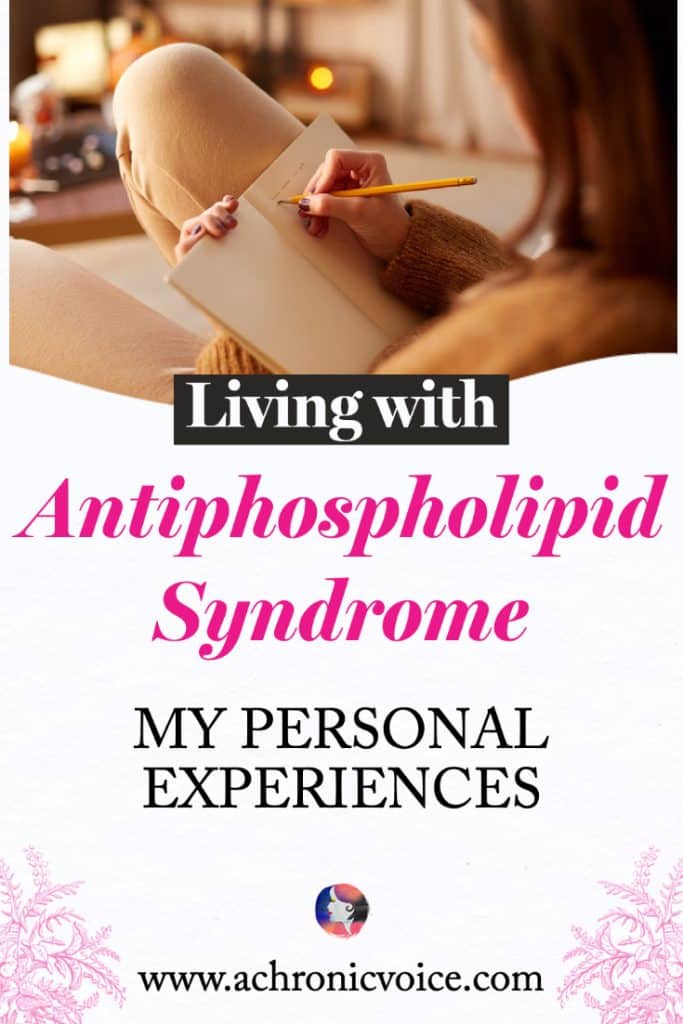
Table of Contents
What is Antiphospholipid Syndrome? (Also Known as Hughes’ Syndrome)
There are a few different types of blood clotting disorders, one of which is Antiphospholipid Syndrome (APS or APLS). It’s also known as Hughes’ Syndrome , after the doctor who first described it in 1983 (Hughes, G., 2007). (Fun fact: I’ve visited him in person in London!)
How the blood clots or is inherited varies for each these disorders, but in APS what it means is that the body produces certain antibodies called Antiphospholipid Antibodies (APLAs) (Misita, C. P. & Moll, S., 2005). These antibodies interfere with phospholipids (Irvine, R. F. & Divecha, N., 1992), which are required for normal blood clotting functions (Garmo, C. et al., 2018). If you recall, many COVID-19 patients had an increase in antiphospholipid antibodies too, some of whom sadly succumbed to the thrombosis (Jordhani, M. et al., 2021).
Pin to Your Antiphospholipid Syndrome & Autoimmune Disease Boards:
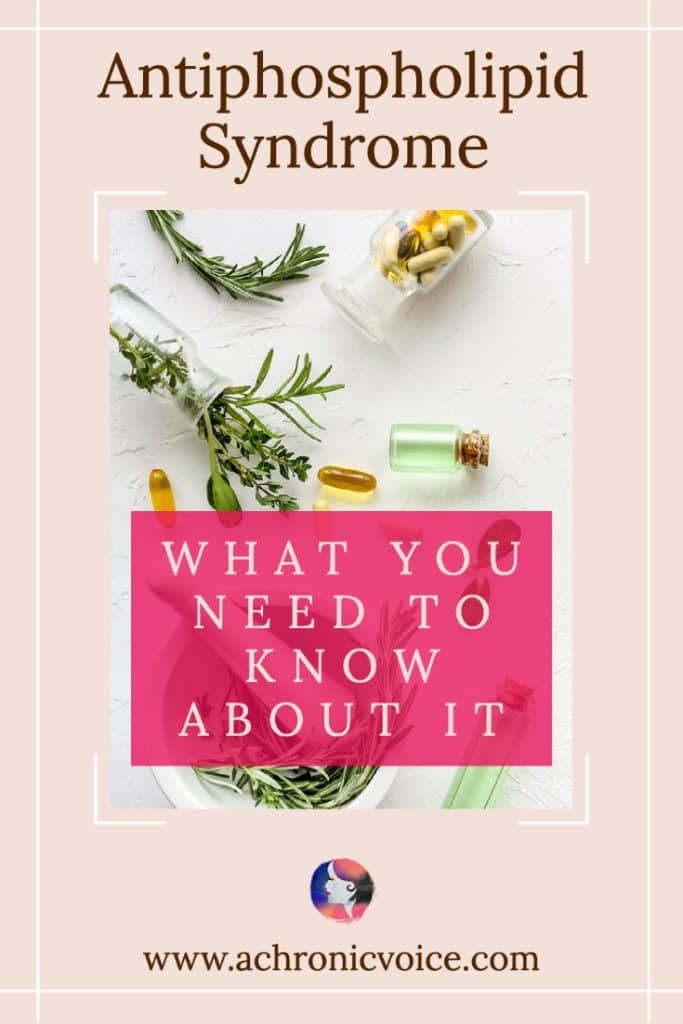
Try This Treatment for Your Lupus! Hold on a Minute…
I have other chronic illnesses and autoimmune diseases, such as Lupus, Sjögren’s and Epilepsy. There are quite a number of alternative and complementary therapies out there for these chronic illnesses. A lot of them are well established, or have good reviews from other patients. There are even renown TCM (Traditional Chinese Medicine) practitioners for Lupus in Asia who come highly recommended, yet I’ve never visited them.
It gets a little tricky when it comes to APS, supplements, and herbs, especially Chinese ones (Chua, Y. T. et al., 2015), because many of them have a blood thinning or thickening effect. I once visited a TCM practitioner and tried to explain my conditions. He gave me some herbs, but when I Googled them, I realised that they’d all mess with my warfarin, a common anticoagulant medication used for APS, and which I take.
Warfarin & Caution with Prescribed & OTC Medications
Apart from alternative and complementary therapies, I also need to work closely with each of my doctors who prescribe me medications. Everyone on your healthcare team should be aware that you have APS, and that you’re taking warfarin, as many medications and treatments can interact with it. In fact, it’s one of the first things I tell the triage whenever I need to go to the A&E.
You also need to be cautious with antibiotics and over-the-counter medications when living with Antiphospholipid Syndrome. NSAIDs (aspirin, ibuprofen, naproxen, etc) are a common OTC drug for quelling fevers, menstrual cramps and minor aches. Yet I can’t take them unless absolutely necessary as they are a blood thinner, and might result in excessive bleeding in the stomach or elsewhere.
Sometimes the interaction isn’t that straightforward either. For example, antacids and laxatives can interact with warfarin, though they seem fairly innocuous. I use the MedScape app to check for common interactions. (I once snooped a doctor using it to check for warfarin interactions as well!) It can be downloaded on your phone, and you can check any medication combination for interactions anytime.
The Different Types of Blood Thinners Out There
There are a few different types of anticoagulants used for various conditions. The way aspirin works differs from warfarin, which differs yet again from Rivaroxaban (Xarelto) or Enoxaparin (Clexane/Lovenox).
A person with a metallic heart valve might take a different type of anticoagulant medication, as opposed to someone with APS or Factor V Leiden. Something to bear in mind is that there are different brands of such anticoagulants. You should always discuss changes with your doctor, as their effectiveness may vary from person to person.
Rivaroxaban has a benefit in that you don’t need to monitor your diet, as it thins the blood in a different way than warfarin. For most patients living with Antiphospholipid Syndrome however, warfarin is still one of the most effective anticoagulants. This is especially so if you’ve suffered from blood clots before, and I’ve had multiple DVTs and a Pulmonary Embolism, which nearly costed me my life. Thus, my INR target range needs to be even higher, and this is only possible with warfarin where you can adjust the dosage with more flexibility.
Pin to Your Living with Antiphospholipid Syndrome Boards:
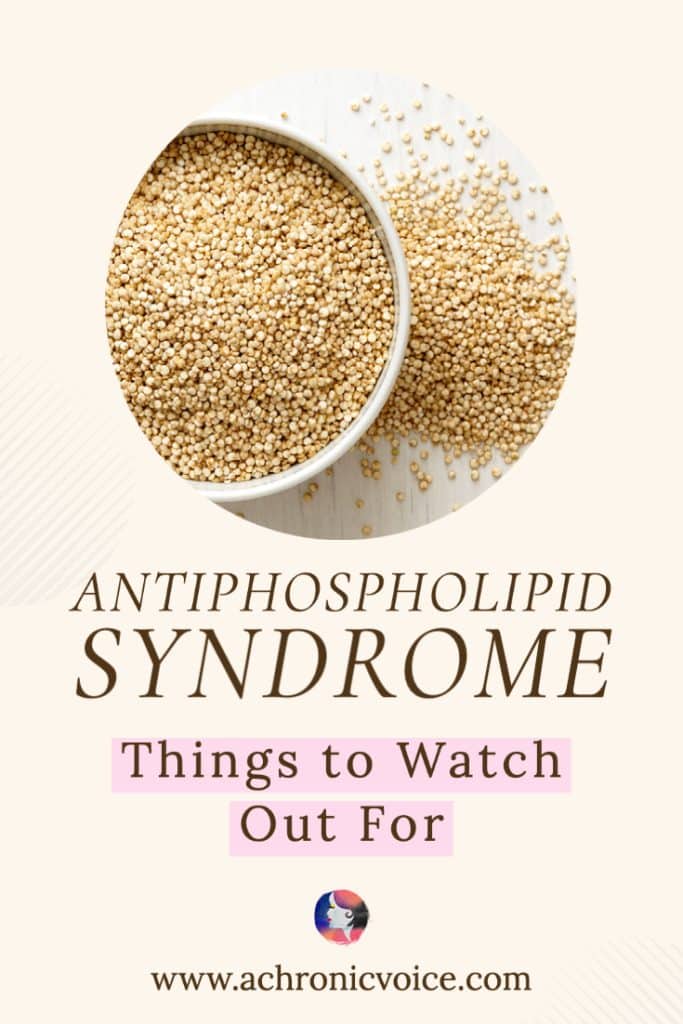
Genetic Factors & the Accuracy of Blood Test Results in APS
There are also genetic differences between people of Caucasian and Asian descent when it comes to APS (Lam, M. P. & Cheung, B. M., 2012), and how warfarin interacts with their blood. For example, Chinese tend to required lower dosages of warfarin as compared to Caucasians. On the other hand, Indians tend to need higher dosages as their body metabolises it faster (Gan, G. G. et al., 2003).
Regular Foods Mess with Warfarin, Too
Putting medication and herbs aside, even regular fruits, vegetables, meats and other foods can interact with warfarin, and the effects can take hold pretty fast. For example, if I ate three pieces of broccoli for dinner, my blood would become thicker by the following morning, sometimes even dropping to the INR baseline (a measurement for how fast your blood takes to clot, which is 1.0 for the average person).
This is fine if I keep my intake regular (three pieces of broccoli every week, no more, no less!), as my doctor adjusts my warfarin according to my regular diet. But that means no gorging on a big bowl of salad, or gulping down a random cup of kale juice because hey, isn’t that supposed to be healthy?!
“Putting medication and herbs aside, even regular fruits, vegetables, meats and other foods can interact with #warfarin, and the effects can take hold pretty fast.” #AntiphospholipidSyndrome #APS #RareDisease #ChronicIllness Click To TweetPin to Your Warfarin, Antiphospholipid Syndrome & Food Boards:
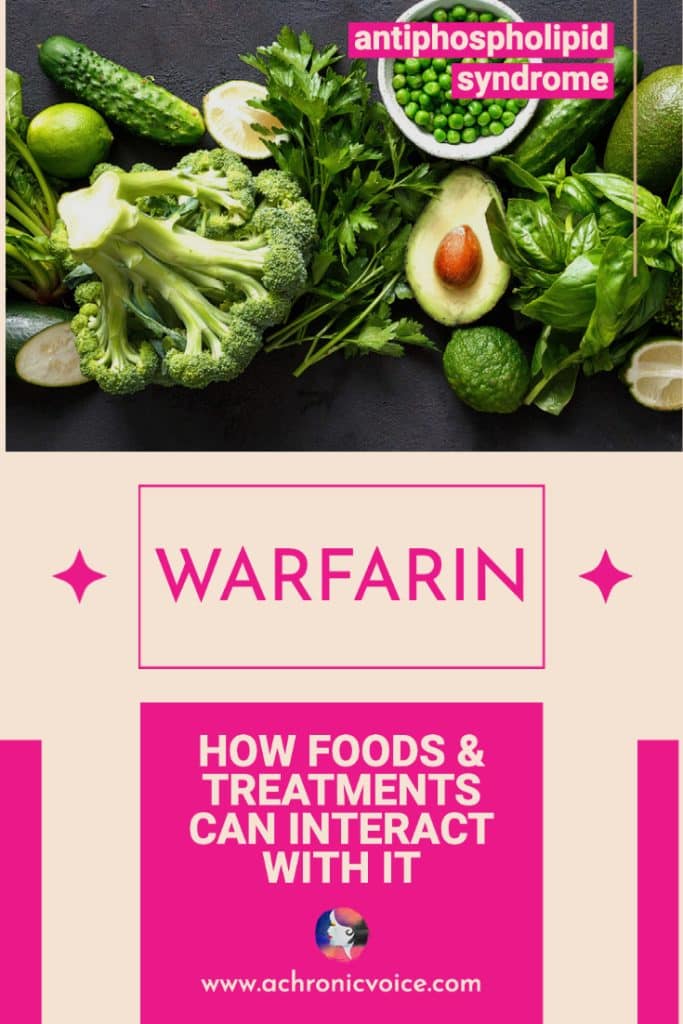
Don’t Forget About Blood Thinning, Too
It isn’t only blood clotting that you need to be aware of as well, as I learned the hard way. I once ate a plate of quinoa, only to wake up to a giant bruise that spanned my entire arm. I discovered that it wasn’t the seed itself, but the hull which contains blood thinning agents called saponins (Chen, C. et al., 2015).
You can identify most foods that contain vitamin K as they are either green in colour, leafy vegetables, or on a known list. Blood thinning foods are trickier as you can’t always tell until something happens. Research helps, but data can be a little sketchy. There is more medical literature on vitamin K than blood thinning foods.
This does not go to say that you should avoid all fruits and vegetables ‘just to be sure’, because they still contain nutrients that are essential and good for our bodies. What’s most important when on warfarin is how consistent your diet is to a certain degree.
Foods are Powerful (and Dangerous!)
Foods can trigger or suppress inflammatory responses within our bodies. For example, turmeric is great for combating inflammation caused by Lupus and Sjögren’s, but it’s also a blood thinner. Hence, people with APS can’t just go buy a bottle of turmeric tablets and start popping them, even if it might be beneficial for their other conditions. The same goes for fish oil that is rich in omega-3, but also has anticoagulating effects.
If it’s something that they would like to try, then they need to discuss this with their doctor, and monitor their blood tests for a period of time. It’s not impossible, but there are many additional steps to take for every little change.
Pin to Your Antiphospholipid Syndrome, Food & Diet Boards:
![Diet Problems - Living with Antiphospholipid Syndrome [The bottom half of a girl's face, smiling as she eats a bowl of salad with a fork.]](https://www.achronicvoice.com/wp-content/uploads/2023/04/diet-problems-living-with-antiphospholipid-syndrome-1-683x1024.jpg)
When You Add Alternative & Complementary Treatments into the Mix as Well
As someone living with Antiphospholipid Syndrome, I need to avoid contact sports, or any activity that increases the risk of bruising or bleeding. Some alternative therapies such as cupping therapy work by causing mild injuries, so trying them is out of the question. The same concept applies to tattoos as well, if you were wondering.
If I add Lupus back into my bag of chronic conditions, it means that I also need to avoid trying stuff like light therapy, infrared saunas and more. Lupus patients tend to be photosensitive, and these treatments could trigger a flare in symptoms. If we combined all my chronic illnesses together, there isn’t much left for me to try in terms of alternative or complementary therapies.
One complementary therapy that I did try was floatation therapy. I was initially hesitant as I read that it might not be safe for those with Epilepsy, but I had the green light from my neurologist since I was stable. Whilst it did not help to ease the chronic pain that I get from Lupus and Sjögren’s, I did experience deep relaxation, and had the best sleep that night in years.
Psychiatric Side Effects & Interference with Treatments for Mental Disorders
APS can also cause psychiatric disorders, such as mania, depression, Bipolar Disorder and Schizophrenia (Man, Y. L. & Sanna, G., 2022). I personally live with clinical depression, anxiety and panic attacks. Although my doctors and I think that these mental health issues were triggered by my steroid therapy, it’s hard to really be sure as I live with many chronic illnesses, and take about 20 pills a day.
Any one of these chronic illnesses can cause cognitive dysfunction as well. I once experienced mysterious brain fogs for an entire year, and was first referred to my neurologist, who confirmed that it wasn’t related to Epilepsy. Then my psychiatrist, together with my rheumatologist, went through the whole year trying to pin it down. I was put on new medications and taken off them many times. Was it due to APS, Lupus, Sjögren’s, depression, or something entirely new? In the end, we concluded that it was a manifestation of Lupus (SLE) in the CNS (central nervous system), which is a diagnosis of exclusion. It can be tricky because APS can cause brain fog, too.
Antiphospholipid Syndrome Increases the Risk of Any Surgery
Many surgeons and anaesthesiologists aren’t keen to carry out a surgical procedure on patients with APS, due to the risk of blood clots. Sometimes, APS patients die not from the surgery process itself, but from unexpected blood clots. In fact, this was a major issue amongst surgeons when I needed to get my mitral valve repaired a few years ago. None of them were keen to operate on me as I have APS, and suggested that I hold it off for as long as I could. This was contrary to the advice of the top heart hospital in the U.S., and I had to go there to get it done in the end.
It’s also not a good idea to get sliced open whilst on an anticoagulant ike warfarin either – I’m sure you can imagine why. This includes dental procedures as well. For a planned surgery, a protocol needs to be followed where you are weaned off the oral warfarin in replacement with self-injected LMWH (Low Molecular Weight Heparin) (Solari, F. & Varacallo, M., 2018). The mechanism of LMWH works differently from warfarin in that the anticoagulant effect lasts for about only 12 hours. There used to be a downside in that there was no antidote for it, but now there is protamine for Lovenox (Applefield, D. & Krishnan, S., 2019), and Aandexanet alfa for Xarelto (Brown, C. S. et al., 2020).
After about a week the INR should have come back down to the baseline. The LMWH is stopped the night before, so that you will not bleed excessively during the surgery. LMWH is then used as a bridge when it’s deemed safe to resume your warfarin. Note that this is just from my personal experiences – the protocol for your own surgery or medication adjustments may differ, based on your own condition, and assessment by your healthcare team.
“Many #surgeons & #anesthesiologists aren’t keen to carry out a surgical procedure on patients with #APS, due to the risk of #bloodclots. Sometimes, APS patients die not from the #surgery process itself, but from unexpected blood clots.” Click To TweetEmergency Surgeries are Never Straightforward with Antiphospholipid Syndrome
The most recent major event caused by my APS was an ovarian cyst rupture. Such ruptures can happen to any woman during ovulation; they often feel some pain and probably just regard it as menstrual cramps. As I was on warfarin, the rupture wouldn’t stop bleeding, and soon there was a 9cm (3.54″) mass of clots inside me.
I had waited for two days before heading to the A&E, as pain is a guessing game when you live with so many chronic illnesses. You never quite know the source of the problem, and I had assumed it was just period cramps or swelling from Sjögren’s. In fact, to me the pain from the cyst rupture was initially bearable, compared to a bad pain flare day.
People do get surgeries done immediately to remove such massive clots, but because I was on warfarin and have APS, no surgery is ever straightforward. So they put me in the high dependency ward, gave me painkillers, blood transfusions, then we just hung around to ‘see how it goes’. (P.s. It happened a second time which was much worse. You can read about it here.)
Pin to Your Antiphospholipid Syndrome & Surgery Boards:
![Surgical Complications with Antiphospholipid Syndrome [Background: Surgeon in scrubs putting on plastic hand gloves.]](https://www.achronicvoice.com/wp-content/uploads/2023/04/surgical-complications-with-antiphospholipid-syndrome-2-683x1024.png)
Pregnancy Complications with Antiphospholipid Syndrome
APS can also be a problem for women who want to get pregnant. ‘Surprises’ should be avoided as warfarin can be harmful to foetuses, and can cause Fetal Warfarin Syndrome (Sousa, A. R. et al., 2018). Women who plan on getting pregnant need to go on LMWH injections before they try for a child, and also during the pregnancy.
I actually prefer Clexane/Lovenox (the brand of LMWH I take) to warfarin as I don’t have to worry about the foods I eat. It isn’t good as a long-term solution however, even if I don’t mind injecting myself twice a day. It’s possible to develop a resistance to it, and can also weaken your bones (Gajic-Veljanoski, O. et al., 2016). That isn’t a good thing when I’m already at osteopenia levels, due to the steroids I take to control my Lupus and Sjögren’s. (The biggest tendons in my knees ruptured spontaneously because of this, which left me disabled for a year.)
The most dangerous period during pregnancy with APS is during the later stages, as this is when blood clots tend to form, cutting off supply to the placenta. Losing a baby at any stage of pregnancy is heartbreaking, and to have it die just before birth can be highly traumatic. I’ve heard of too many heartbreaking stories where people only discover that they have APS after recurrent miscarriages. I suppose that diagnosing such disorders isn’t exactly straightforward, yet such losses are preventable to a large extent (up to 80% successful birth rates for people with APS) (Schreiber, K. & Hunt, B. J., 2019).
Travel Concerns with Antiphospholipid Syndrome
Diet Changes
Just like you, people living with Antiphospholipid Syndrome love to go on holidays, but there are extra precautions we need to take. For one, our diets tend to change overseas. We not only lose access to our regular groceries, but some of us also want to sample as much of the local cuisine as possible! But who knows what ingredients are really in these recipes? The amount of food you eat and the change in meal times can also have an overall impact on how thin or thick your blood becomes.
“Just like you, people living with #AntiphospholipidSyndrome love to go on #holidays, but there are extra precautions we need to take. For one, our #diets tend to change overseas.” #ChronicIllness #InvisibleIllness Click To TweetDifferent Formulations of OTC Medications
Different countries favour different brands of medications for various reasons. This includes OTC medications, and I often cannot access familiar brands or the same formulations whilst travelling. In such scenarios, the MedScape app comes in handy. Having said that, the best solution is to carry your own ‘mini pharmacy supply’ whilst travelling. I usually spend a few hours just packing all my medications – from regular, to ‘as and when needed’, to emergency ones.
A Blood Clot is a Medical Emergency
A DVT or blood clot is a medical emergency that requires immediate attention. The biggest concern is that these blood clots break up, and lodge in places they shouldn’t be in, such as the brain, heart or lung, which can even result in death. Finding a hospital overseas can be tricky for anyone, especially if you don’t speak the language, or are in a rural area.
When you do reach the hospital, you need to explain your medical conditions to the healthcare team all over again. Time zone differences may make it difficult to contact your doctors back home as well. If you’re alone, this can be even trickier. That is why it is essential that you carry medical information cards on your person wherever you go, so that doctors know about your medical conditions should you be unable to communicate.
“A #DVT or #bloodclot is a #medicalemergency that requires immediate attention. The biggest concern is that these #bloodclots break up, and lodge in places they shouldn’t be in, such as the brain, heart or lung.” #AntiphospholipidSyndrome Click To TweetThe Need to Monitor Even the Slightest Injury
Even minor scrapes and cuts need to be monitored. I once had a paper cut overseas that wouldn’t stop bleeding for an entire day. Fortunately, it finally stopped, but not after my thumb had turned blue from the bandage! It would have been not only annoying to need to go to a clinic or hospital overseas for a paper cut, but also costly. Travel insurance often doesn’t cover chronic illness, even though you can still buy them as a chronically ill person.
Steps I Take to Stay Safe Whilst Travelling with APS
Out of all my chronic illnesses, APS is the one I fear the most whilst travelling, as it can be the most complicated to treat, and also strikes quickly. Sometimes I ask my rheumatologist to convert me to Clexane just for that duration of time, so that I don’t have to fret over changes in my INR.
I also purchased a CoaguChek machine which allows me to check my INR on my own. My doctor and I took a few months to test it against veinous blood tests, and it’s about a +-0.3 difference in reading. So for me it’s fairly stable, and brings me peace of mind whilst on the road. (Please work with your own doctor to test your machine, as results can vary quite a bit.)
Pin to Your Antiphospholipid Syndrome & Chronic Illness Life Boards:
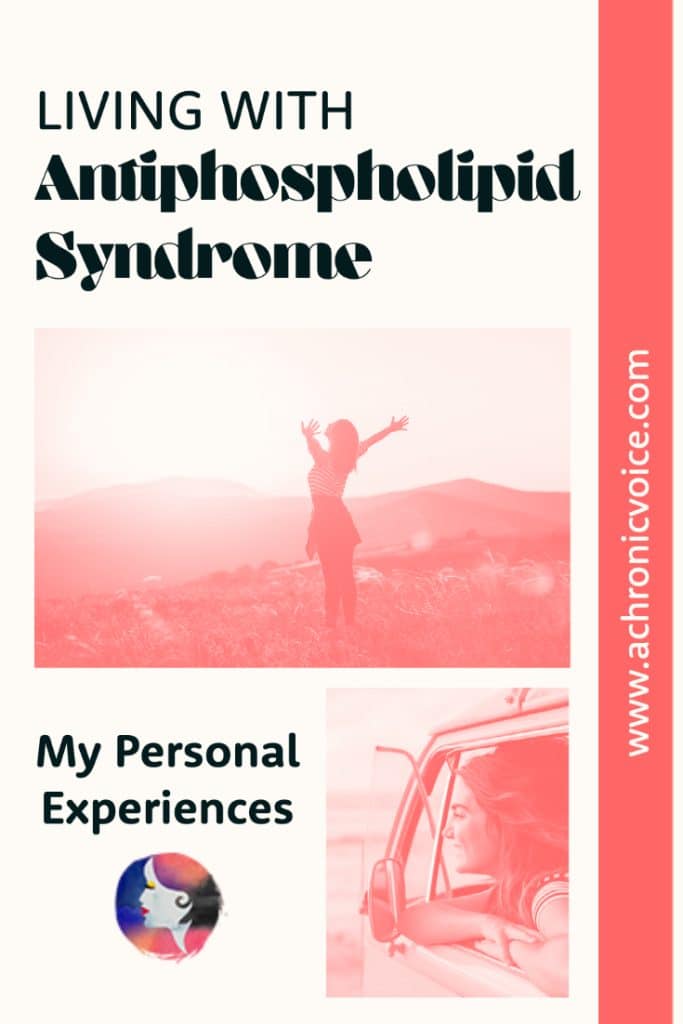
Common Sense Becomes Uncommon When Living with Antiphospholipid Syndrome
Home ‘remedies’, such as massaging a bruise in order to help with blood circulation to promote healing, are a big no when it comes to APS. Doing so increases the chances of blood clots spreading to other parts of the body. I’m always super worried whenever I get a bump on my head. Whilst I live with microhaemorrhages in my brain, a massive clot would be disastrous.
Epileptics don’t always have to go to the A&E/ER after every seizure, but those with APS like me are advised to do so anyway. This is to ensure that I’m not bleeding in my head or somewhere else, as I wouldn’t have known what had happened when I collapsed. Even the way I nourish myself for recovery can become a puzzle to solve.
Why I Call Antiphospholipid Syndrome ‘The Silent Killer’
Part of why chronic illness is complex is because no two diagnoses are equal; people with the same disorder can manifest symptoms on extreme ends of the same spectrum. Whilst APS is a blood disorder, symptoms can appear anywhere in your body. The classic big bad stuff that it’s known for are strokes, heart attacks, pulmonary embolisms (clots in the lung), and brain haemorrhages. But it can also cause memory and cognition problems, headaches, edema, and even hearing loss, seizures, death, and mental disorders.
For me, living with Antiphospholipid Syndrome doesn’t typically cause the biggest issues on a regular day. It’s Lupus and Sjögren’s that batter my body with muscle aches, joint pains, swelling and other problems that I can quite literally feel deep in my bones. But when APS hits, it closes in for a swift kill. It’s like the quiet, well controlled person in the room who never shows anger, but when they do, it’s scary and shocking.
“Part of why #chronicillness is complex is because no two diagnoses are equal...Whilst #APS is a #blooddisorder, #symptoms can appear anywhere in your body.” #InvisibleIllness #AntiphospholipidSyndrome Click To TweetPin to Your Antiphospholipid Syndrome & Chronic Illness Boards:
![Living with Antiphospholipid Syndrome and Other Chronic Illness [Background: Essential oils and vegetables flatlay.]](https://www.achronicvoice.com/wp-content/uploads/2023/04/living-with-antiphospholipid-syndrome-chronic-illnesses-683x1024.jpg)
Is This a Blood Clot, or What?
When I experienced the worst pain of my entire life due to a massive outbreak of blood clots, the general practitioner whom I had first seen brushed it off as muscle cramps. If even a doctor can get it wrong, what am I to do? But I like to think that I’ve become quite an expert in regards to my own body, with the many painful lessons and near-death experiences that I’ve had to go through over the years. It’s like hands-on medical training on steroids (and yes I take steroids, so I actually know what that’s like 😉 )!
So I rushed to the hospital the next time I had chest pains. And the next, and the next. I mean, if I didn’t learn from the most painful experience of my life, then that would be stupid, right? But as it turns out, most of the time it’s due to muscular pains, a mix of my other autoimmune diseases, or regular ailments. It’s tough to tell the differences when you can’t see through your skin. Whilst I’ve learned some tricks to differentiate APS from my other chronic illnesses and the way the pain is presented over the years, these insights aren’t foolproof either.
My Other Autoimmune Diseases Can Also be a Nightmare…
I once missed a flight because I was in unbearable pain, and couldn’t imagine being cooped up in a pressurised, stuffy cabin for 8 hours. It was probably the Sjögren’s that was squeezing pain out of my entire body, as if I were a dying tube of toothpaste. Every joint and muscle in my body felt like they were on fire, and I spent that entire night up pacing, hugging myself and crying in agony.
There are a few levels in every chronic illness patient’s personal pain scale. My 9/10 would be equivalent to screaming in pain throughout the night, and rocking my body into frenzied oblivion. This isn’t an exaggeration – I’ve had nights like these.
“There are a few levels in every #chronicillness patient’s personal #painscale. My 9/10 would be equivalent to screaming in #pain throughout the night, and rocking my body into frenzied oblivion. This isn’t an exaggeration.” #ChronicPain Click To Tweet…But APS Takes the Last Slice of Cake
I save my 10/10 rating for massive blood clotting episodes, like the one I had experienced before. I’d even rate it beyond 10 if I could – it is hell.
Finding Your Own Rhythm, So That You Can Live a Full Life with Antiphospholipid Syndrome
Recognising the signs and symptoms of APS is like a detective game. It takes practice and learning from the many mistakes that you’re bound to make. But you will understand your body better over time as you grow together with it.
I had so many questions when I was first diagnosed with APS as a gawky teenage girl. Seemingly silly questions such as, “Can I pluck my eyebrows, will it cause blood clots?”. My doctor, being an older male, suggested that I avoid this as it would irritate the blood vessels. Small stuff like that. Questions that probably wouldn’t even cross your mind at all. But when you’re living with Antiphospholipid Syndrome, every small action or interaction becomes a puzzle to solve.
As with many things in life, you will just need to find your own rhythm, with lots of patience, time, adaptation, and compassionate attention. Who knows what the future will hold for each and every one of us, but all we can do is to learn, and live as well as possible. I wish you all the best, and if you have any questions or tips to share about living with Antiphospholipid Syndrome, feel free to leave a comment below!
“Recognising the signs & #symptoms of #APS is like a detective game. It takes practice & learning from the many mistakes that you’re bound to make. But you will understand your #body better over time as you grow together with it.” Click To TweetPin to Your Living with Antiphospholipid Syndrome Boards:
![Living a Full Life with Antiphospholipid Syndrome - Read the Post [Background: Silhouette of a girl with long, straight hair. Her arms her raised joyfully against an evening sky.]](https://www.achronicvoice.com/wp-content/uploads/2023/04/living-full-life-with-antiphospholipid-syndrome-683x1024.png)
If you liked this article, sign up for our mailing list here so you don’t miss out on our latest posts! You will also receive an e-book full of uplifting messages, quotes and illustrations, as a token of appreciation!
-
References:
- Hughes, G. (2007). Hughes Syndrome: the antiphospholipid syndrome—a clinical overview. Clinical reviews in allergy & immunology, 32, 3-11.
- Misita, C. P., & Moll, S. (2005). Antiphospholipid antibodies. Circulation, 112(3), e39-e44.
- Irvine, R. F., & Divecha, N. (1992, August). Phospholipids in the nucleus—metabolism and possible functions. In seminars in CELL BIOLOGY (Vol. 3, No. 4, pp. 225-235). Academic Press.
- Garmo, C., Bajwa, T., & Burns, B. (2018). Physiology, clotting mechanism.
- Jordhani, M., Ruci, D., & Ruci, V. (2021). AB0696 ANTI-PHOSPHOLIPID AUTOANTIBODIES IN COVID-19 PATIENTS.
- Chua, Y. T., Ang, X. L., Zhong, X. M., & Khoo, K. S. (2015). Interaction between warfarin and Chinese herbal medicines. Singapore medical journal, 56(1), 11.
- Patel, S., Singh, R., Preuss, C. V., & Patel, N. (2022). Warfarin. In StatPearls [Internet]. StatPearls Publishing. Retrieved from: https://www.ncbi.nlm.nih.gov/books/NBK470313/
- Lam, M. P., & Cheung, B. M. (2012). The pharmacogenetics of the response to warfarin in Chinese. British journal of clinical pharmacology, 73(3), 340-347.
- Gan, G. G., Teh, A., Goh, K. Y., Chong, H. T., & Pang, K. W. (2003). Racial background is a determinant factor in the maintenance dosage of warfarin. International journal of hematology, 78, 84-86.
- Chen, C., Yang, F. Q., Zhang, Q., Wang, F. Q., Hu, Y. J., & Xia, Z. N. (2015). Natural products for antithrombosis. Evidence-Based Complementary and Alternative Medicine, 2015.
- Man, Y. L., & Sanna, G. (2022). Neuropsychiatric Manifestations of Antiphospholipid Syndrome—A Narrative Review. Brain Sciences, 12(1), 91.
- Solari, F., & Varacallo, M. (2018). Low molecular weight heparin (LMWH).
- Applefield, D., & Krishnan, S. (2019). Protamine.
- Brown, C. S., Scott, R. A., Sridharan, M., & Rabinstein, A. A. (2020). Real-world utilization of andexanet alfa. The American Journal of Emergency Medicine, 38(4), 810-814.
- Sousa, A. R., Barreira, R., & Santos, E. (2018). Low-dose warfarin maternal anticoagulation and fetal warfarin syndrome. Case Reports, 2018, bcr-2017.
- Gajic-Veljanoski, O., Phua, C. W., Shah, P. S., & Cheung, A. M. (2016). Effects of long-term low-molecular-weight heparin on fractures and bone density in non-pregnant adults: a systematic review with meta-analysis. Journal of general internal medicine, 31, 947-957.
- Carp, H. J. (2004). Antiphospholipid syndrome in pregnancy. Current Opinion in Obstetrics and Gynecology, 16(2), 129-135. Retrieved from: https://journals.lww.com/co-obgyn/Fulltext/2004/04000/Antiphospholipid_syndrome_in_pregnancy.6.aspx
- Schreiber, K., & Hunt, B. J. (2019). Managing antiphospholipid syndrome in pregnancy. Thrombosis research, 181, S41-S46.

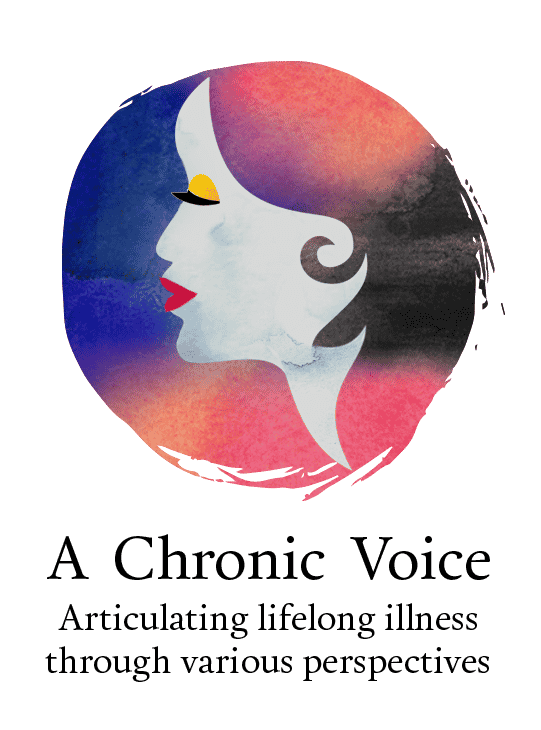

Thanks for writing this very comprehensive piece on APS, Sheryl. I was unaware the syndrome existed until I had a series of strokes and ended up in the hospital at age 56. It took a while to diagnose me but eventually I learned I had APS and a type of vasculitis called polyangiitis with granulomatosis. Am on warfarin for the APS and get infusions of Rituxan for the vasculitis. For me, the biggest issue (aside for the strokes and occasional blood clots) has been having to take a break from the Rituxan so Covid vaccinations could be effective. And, of course, it’s a pain to have to think about everything I eat and drink. Let’s hope someday a blood thinner that works as well with APS as warfarin is developed!
Hi Mary, I’m so sorry to hear that you had to go through such a scary experience. I hope you are doing better now. Is there anything in particular about APS you’d like to know more about? I plan on writing a post about foods but have been procrastinating because it’s such a huge topic and so variable!
This is very comprehensive post! I was not familiar with this particular condition, but can appreciate how delicate the balance can be between how prescription drugs, supplements and food can affect our blood. I’ve noticed this based on my INR results over time – definite differences based on my dietary changes, as well as when taking certain medications.
Thanks Sandy! Do you have a blood disorder that requires you to test your INR frequently, too?
Hey Sheryl,
Thanks so much for writing this up! APS sounds incredibly frustrating, indeed! I really appreciate you sharing this, and I[‘ve got a much better understanding o what you’re managing now.
This makes me feel so fortunate that no matter how weird my FND symptoms are, I’m unlikely to need emergency services. When even the doctors get confused, it’s a tough fight to get the proper care.
THank you Alison for your support. Yes APS is really a silent killer. A lady on my Instagram just shared her story of losing her baby at birth, and nearly losing her life, all from blood clots caused by undiagnosed APS. It really strikes hard and looms in the background. Sending you love! x
Hi Sheryl, I’ve just been diagnosed with APS after going to hospital emergency in April with 3 clots in my lungs. Amid all the Covid19 dramas happpening around the world this came as a huge and unexpected surprise. I’m a 45 year old mum of three, have always been active and always worried I’d get a chronic disease like Type II Diabetes since my mum has it so I watch what I eat (most of the time) and considered myself fairly healthy.
It was so good to read your article and hear your experiences as I’m still navigating through it all and having a rollercoaster of emotions when I read new information. I was put onto Xaralto from the time I left the hospital and got my diagnosis 2 months later which is when the Dr recommended I change to Warfarin as after getting my blood checked again found that the Xaralto wasn’t effective enough to thin my blood with an INR of 1.5.
So I have just begun my Warfarin and am a bit nervous about how I keep my INR consistant with what I’m eating (because of the greens) but your article has given me some good ideas and advice. I know that I have to follow my Drs and pathology advice but knowing I’m not alone is really reassuring. Thanks so much.
Hi Josie, I am sorry to hear about the diagnosis 🙁 It must be hard to grasp it at 45, especially with a family and total change in lifestyle that impacts everyone. But you are not alone. Yes for APS the general advice is to use warfarin instead of Xarelto as it’s not enough to thin the blood, and especially more so if you’ve had clots before (and 3 clots in the lung are quite a lot in a go). I am NOT a doctor however of course, so don’t take this as advice, just sharing my personal experiences and reading 🙂 Sending you good thoughts. Hope to keep in touch, as there’s not many people with APS online whom I know!
This is a fantastic resource page. I have a friend with APS and she has told me a lot about what she deals with here in Taiwan. She has mentioned a few times that the health care she receives here is top notch compared to what she had back home in Canada – instant access to ER, for example, is a huge thing for us here. I really learned a lot more about what you are coping on a day to day basis and will be mindful of her experiences the next time she talks to me about them.
Your comment about TCM made me smile a bit. It’s pushed heavily here in Taiwan, with doctors being able to cure cancer and lupus. I fell for that in 2011 through 2014 and it made me worse. Plus, no cure and a lot of money down the drain. It seems to be great for some folks and terrible for others. I did not know that Chinese herbs affect your blood like that!
Thanks so much for sharing your experiences and your research, as always!
Haha thanks Carrie – re TCM. Yea I have a lot of relatives and people pushing that on me too (we’re Asians after all). So I just scare them a little bit or just shut them off if they don’t listen. I know that there are some great TCMs out there for Lupus but unfortunately, I don’t even want to try because of APS. It gets so tricky. Even with Western medications where the interactions are more researched and defined it’s tricky, what more herbs of an unknown quantity.
I wish your friend well, next time I can meet her too, perhaps! 🙂
I had no idea what Antiphospholipid Syndrome was – I feel really well informed now Sheryl…. and I didn’t find the subject to be dry at all 🙂
Thanks Shruti! This post barely scritches the surface of the topic, but it’s got to start somewhere! I really need to add more resources on my blog about APS as it’s super rare compared to say, Lupus resources, which is also not enough 🙁
Thank you so much for sharing this information Sheryl. It’s amazing how much I learn from people living with chronic illness conditions, and your posts are always so well researched and helpful.
Thanks Claire, I try my best! Misinformation is super harmful so I try my best to do no harm in that regard to the best of my knowledge. I learn a lot from you and others with different conditions, too!
Wao this is such a big deal. Didn’t know about this illness. Thanks for sharing your experience.
Thanks for reading and trying to understand, Jessica. People like me appreciate it so much 🙂
I never heard of this condition but thanks for creating the awareness. Interesting to read
Thanks King, yes it’s a pretty rare disorder, although many people only find out when it’s too late. Thanks fo rreading!
I have never heard of this disorder before but it is really interesting to learn about it. How scary it must be to have to manage this illness.
Hi Danielle, yes hence the need to raise awareness. So many rare diseases out there, unfortunately 🙁
Health is wealth indeed, thanks for your posts that help people be more aware and careful of their health.
It sure is, and one that many take for granted, until sadly it’s too late! Sending good thoughts and wishing you health and happiness in the new year!
I seriously had no idea regarding antiphospholipid syndrome, You are doing a great job in creating awareness.
Thanks for the post.
Thanks Samar, I’m glad that the word is getting around, but it’s not enough for sure. Here’s to more awareness!
Thank you for helping to bring awareness to this disease. Will was on blood thinners when he had his new heart a few years ago,.
Hi Susan, sorry to hear that…I hope he is coping much better now? Yes they usually give warfarin for metal heart valves, but different countries have different protocols, too. And sometimes they take a different sort of blood thinner, as the sort you need for the heart is different. We decided against aspirin on top of warfarin for me (I have Antiphospholipid Syndrome and a repaired mitral heart valve, too 🙂 ).
I love how informative you are! I’ve never heard of this, but I write about my own disorders and polycystic ovarian syndrome to help educate others.
Hi Britney, that’s awesome that you do so. Will be following you on social media! 🙂
I haven’t heard of this syndrome before. You habe avery detailed and informative post about it. Thanks for sharing knowledge..!
It’s a very rare condition, hence why the need to raise more awareness about it. Many people especially women only find out when it’s too late (such as a miscarriage). 🙁
I have never heard of this but what an interesting read. Love medical related articles.
Thanks Jackline, just trying to raise more awareness, especially from 2020 onwards! Medical articles can be quite fascinating, hey? 🙂
I’ve not heard of APS before, though have heard of Lupus. I admire your courage how you deal with this condition. It’s really great that you came out with your story, it will be an inspiration for others dealing with this condition.
Thank you Bindu, for taking the time to read, it means a great deal to me! Wishing you and your loved ones health in the new year!
so lovely to bring awareness about this syndrome, thank you for writing and sharing this with all of us.
Thanks Bella, it’s very much needed. Thanks for reading!
I recently read about this when one of my colleagues shared story how she was sick for months, feeling bad and without any straight to do anything. Luckily she is better now but afraid that this can happen to her again. Thank you for sharing this. Happy Holidays!!
You’re welcome Milica. If she’s new to Antiphospholipid Syndrome, you might want to share this article with her. There’s not a lot of patient perspective out there and I’m trying to raise more awareness about APS next year! 🙂 Have a good one, too!
Thanks for creating awareness about this syndrome. Earlier I never heard about APS. You mentioned each and everything about APS. I am sharing in my few groups
Thanks Sundeep, a lot more awareness is certainly needed, and is my aim for the new year! It’s a deadly one, and a real subtle one at the same time.
Hi Sheryl, thank you for this article on APS. I myself has a blood disorder that happened 2 years ago while having my lung surgery (CA stage 1a). Took the haematology doctors 1 week to find out what is the problem with the blood as it is not clotting properly. Not sure if you heard about TTP. Was on steroids, plasma transfusions and chemo drugs. Body pain is there consistently. Good days and bad days. My symptoms very similar to yours so I can empathy with your feelings. Be positive.
Thank you for sharing such a comprehensive post, Sheryl. I wasn’t aware of all of this but appreciate knowing now.
Thanks for taking the time to read and learn, Rachel. Those of us with APS really appreciate it! 🙂
I really do think that APS is under appreciated and not given enough attention, so you’ve done brilliantly raising awareness of this. You’ve met Hughes, the doctor who discovered it? Wow, how did that encounter come about? Very interesting about the link to diet, most of which I didn’t have a clue about. I know you said you’d put this post off a bit fearing it was a rather dry subject, but it’s such an important one and I think you’ve done brilliantly in making this easy to understand and getting across key information clearly, which couldn’t have been easy given the complexity of it and how the condition can impact other conditions.
Caz xx
For some reason I missed this comment, sorry Caz! The encounter wasn’t much help (different ethnicities I guess, react differently), but he was such a nice and caring doctor from what I recall.
Thank you so much for the support and kind words – they’re deeply appreciated! And yes, this post surprised me by becoming one of the top 5 on my blog. I thought it’d fade into history, but it seems like there are people out there who need this information from a patient’s perspective. Sending hugs! x
At last some information about aps,
I’ve just been told I got aps after 4 years of clotting mine is triple positive APS and Lupus just trying to get use to it I’ve been on warfarin for 3 weeks
Hi Daniel, yes I have a combination of chronic illnesses too – like you I have APS and also Lupus (SLE). And I was also frustrated because even I myself am guilty of talking more about the Lupus than APS, yet the APS is a huge problem in itself! Shoutout if you have any questions, and I hope you manage to find a good balance in your life!
Hi,
We found out my 16 yr old daughter has triple positive APS as well last year and she lost right vision permanently from CRAO (central retinal artery occlusion) due to APS in October, and just 2 weeks ago had a stroke. How are you doing? Hope all is well.
Oh dear, I am so sorry to hear this, Rei 🙁 APS can be so tricky as it hits so ruthlessly, and fast. How is she coping? Send her my well wishes x
This sounds so scary I’m really hoping my tests turn out to be negative. I’m still sick with bronchitis so I think I’ll be waiting a bit to have my labs done but at least I know I can talk to a person who has it.
Don’t worry Kali, it’s not so bad 🙂 As you’re unwell right now, it can make you feel more fragile. And yes, feel free to drop me a message anytime at all. I hope you recover from the bronchitis soon!
My sister has APS I’ve tried to help as much as I can although I don’t feel her pain. She had her first stroke at 21 3 more by 25. This article was 100% helpful! Thank you!
Hi Gabrielle, I’m so sorry to hear that she had so many strokes due to APS 🙁 Those are really the ‘big guns’ when APS does hit, and I’m sorry she had to deal with them. She’s fortunate to have such a caring sister like you. Thank you for reading and feel free to let me know anytime you have questions about APS. Wishing you and your family all the best!
This is crazy, I’ve never even heard of this before! It sounds like an absolute nightmare to live with and I really admire your strength dealing with all these conditions at once!
Thanks for reading and trying to understand, Layla, I appreciate it! It’s not so bad really, only when it strikes 😉 I admire you just the same! xx
Oh my goodness, Sheryl, I had no idea how complex APS was to live with, as well as dealing with your other chronic illnesses too. I’m sorry you have to cope with all of this. To constantly be having to think, and weigh up everything you do, must be totally exhausting. I really do admire your positive attitude and all you manage to achieve, despite everything you have to deal with. Great post for raising awareness. xx
Hi Emma, how lovely of you to take some time to read through this large text! Yes it’s less advocated for, I think, because it’s lesser known than Lupus, and also because Lupus does give me more pain on an everyday life basis! I hope this article was easy to understand for someone without APS! Sending hugs xx
Wow – this is so complicated! I can see the huge amount of work you’ve put into pulling this all apart to understand it. It must be such a headache considering every aspect of the introduction of something new to the mix. Lowen x @ http://livingpositivelywithdisability.com
Hi Lowen, thank you so much for taking the time to read and trying to understand APS, even though you don’t have it! I appreciate it 🙂 Yes it’s very complex, but a silent complexity until it strikes! I hope you’re having a great day! x
What an excellent depiction of a day in the life with APS! So many people dismiss me as “dramatic” or “attention seeking” when we both know APS can bring a very tough cookie to their knees- not to mention being dismissed by doctors for anxiety and then the federal government taking away our pain and anxiety medications because of others whom have abused you. Please keep writing. Following.
Hi Misty,
Thank you for reading and following 🙂 Yes APS can really get you all anxious because we can’t confirm a clot or bleed until further tests at the dreaded A&E at the hospital. And the pain can be excruciating! I hope that you don’t have to go through any more episodes!